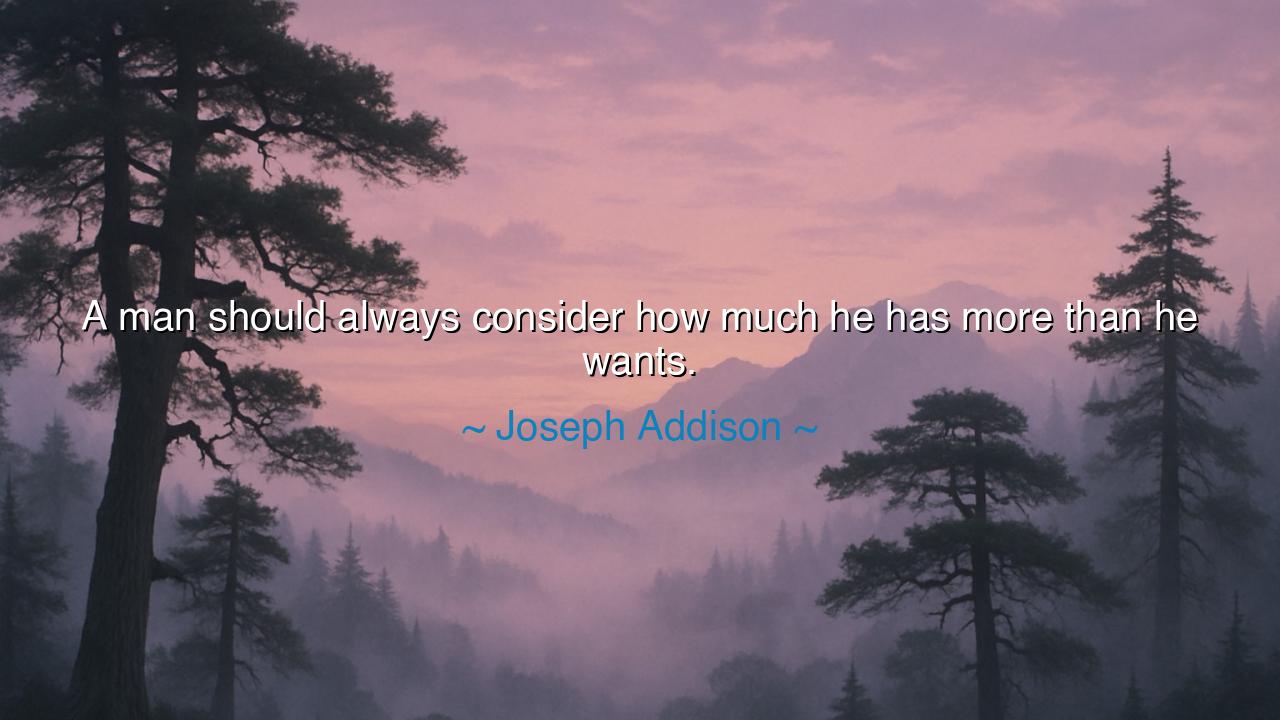
A man should always consider how much he has more than he wants.






Gratitude is the foundation of inner peace. When Joseph Addison declared, “A man should always consider how much he has more than he wants,” he was urging mankind to shift its gaze from desire to abundance. Many souls are endlessly tormented, not by what they lack, but by the illusion that they need more. To consider what one has, to truly weigh it against one’s fleeting wants, is to awaken to a truth both humbling and liberating: that life is already rich, and we are its beneficiaries.
This teaching arises from the timeless struggle between contentment and greed. In every age, men have been tempted to believe that happiness lies in acquiring what lies just beyond their grasp. Ancient philosophers like Epicurus and Seneca counseled against this, teaching that wealth is not measured by possessions but by the fewness of one’s desires. Addison, writing in the early 18th century, spoke from a world steeped in commerce and rising ambition, where material success was swiftly becoming the measure of a man. His words remind us that the true treasure lies not in striving endlessly, but in pausing to recognize the bounty already bestowed upon us.
History offers many examples of those who failed to heed this wisdom. Consider the tragic fate of King Midas, who wished that all he touched would turn to gold. His desire blinded him to the simple joys he already possessed: his family, his food, his very life. When his wish was granted, even his beloved daughter became lifeless gold in his arms. Midas’s story is a parable of insatiable want, showing that unchecked longing often destroys the very happiness it seeks to attain.
In contrast, the ancient Stoic philosopher Marcus Aurelius practiced this principle with discipline. Surrounded by wealth and power as emperor of Rome, he often reminded himself to be grateful for the present moment and to desire little. His meditations reflect a soul striving to be content amidst a world of excess. By focusing on what he already had—his breath, his thoughts, his duties—he avoided being consumed by the cravings that devoured lesser men.
To consider how much we have is to reclaim our sovereignty over desire. It transforms envy into appreciation and restlessness into peace. When a man counts his blessings, he learns that his cup is already full, even overflowing. But when he counts only his wants, he becomes like a wanderer in the desert, forever thirsty though an oasis lies at his feet.
Let future generations take this to heart: happiness is not a distant prize to be hunted, but a choice of vision. When one’s gaze turns inward and upward, when one weighs abundance against desire, the heart becomes free. In this way, Addison’s words are not merely a reflection but a call to action—to live a life where gratitude is the measure of true wealth.






TNNguyen Tran Tri Nhan
Addison’s idea of considering what we have versus what we want makes me reflect on the value of perspective. But in today’s world, is this enough? People are often told to chase their dreams and always want more, and yet this quote suggests that might not lead to happiness. How do we find a balance between being grateful for what we have and pushing ourselves to achieve more in our personal and professional lives?
LNLinh Nhu
This quote brings up an interesting tension between gratitude and desire. In many ways, constantly desiring more can prevent us from appreciating the good in our lives. But could this mindset be limiting? Is it possible to keep striving for growth without feeling dissatisfied with what we have? Does focusing on what we have really lead to more happiness, or could it make us feel stagnant, especially in an ever-changing world?
HYHa Yen
I find Addison’s quote both grounding and challenging. It makes me wonder, though, if it's enough to simply focus on what we have. Shouldn’t we also acknowledge that striving for more can be a healthy driver for personal growth and societal progress? Maybe there’s a danger in overemphasizing contentment at the expense of ambition. How do we stay motivated to improve while not losing sight of the importance of gratitude?
MHNguyen Dang Minh Hang
Joseph Addison’s perspective seems like a call to be more mindful of our blessings. It’s easy to get caught up in wanting more, especially in a consumer-driven society. But is it realistic to expect everyone to adopt this mindset? Can those who are struggling in poverty truly take comfort in what they already have, or do they need to focus on achieving more in order to improve their situation?
GDGold D.dragon
This quote makes me think about how easy it is to fall into the trap of wanting more without appreciating what we already possess. But can we truly be satisfied with what we have if our desires aren't being met? Is it possible to want more without it negatively impacting our happiness? How do we ensure that ambition doesn’t overshadow the value of being content with our current situation?